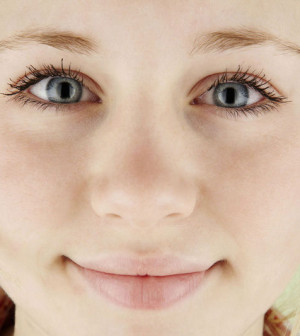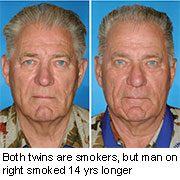- 8 Ways to Increase Dopamine Naturally
- 7 Best Breads for Maintaining Stable Blood Sugar
- Gelatin vs. Collagen: Which is Best for Skin, Nails, and Joints?
- The Long-Term Effects of Daily Turmeric Supplements on Liver Health
- Could Your Grocery Store Meat Be Causing Recurring UTIs?
- Are You Making This Expensive Thermostat Error This Winter?
- Recognizing the Signs of Hypothyroidism
- 10 Strategies to Overcome Insomnia
- Could Artificial Sweeteners Be Aging the Brain Faster?
- Techniques for Soothing Your Nervous System
Study of Twins Shows How Smoking Ages the Face


WEDNESDAY, Oct. 30A study comparing the faces of identical twins confirms what many smokers fear — the habit does prematurely age a person’s skin, taking a serious toll on looks even after just five years.
Researchers from Case Western Reserve University in Ohio used the annual Twins Day Festival in Twinsburg, Ohio, to identify 79 pairs of twins in which one sibling smoked and the other didn’t.
The twins who were smokers showed many more signs of skin aging, the researchers found. Their faces featured more wrinkles, creases, droops and jowls.
“Smoking harms virtually every organ in the body, including your skin,” said Danny McGoldrick, vice president for research at the Campaign for Tobacco-Free Kids. “Whether you are doing it for vanity or your health, one of the most important health decisions of your life is not to start smoking, or to quit if you have.”
The research team attended the Twins Day Festival every year between 2007 and 2010, eventually finding 79 pairs of twins to compare. The twins filled out questionnaires regarding their smoking and lifestyle, and professional photographers snapped individual pictures of them both.
A panel of three plastic surgeons then analyzed the twin’s facial features, grading the amount of aging they saw in each person’s face using a standardized assessment tool. The researchers used questionnaire results to control for other factors that might prematurely age skin, including sun damage, alcohol use and work stress.
Twins who smoke, when compared to their nonsmoking siblings, had worse scores for baggy eyes, baggy cheeks, smile lines and wrinkles along their upper and lower lips.
Researchers also compared the faces of twins who both smoke, but one of the pair had been smoking for at least five years longer than his or her sibling. They found more baggy eyes, baggy cheeks and lower-lip wrinkles in twins who had been smoking longer.
The judges identified the smoking twin as appearing older in photographs 57 percent of the time compared with the nonsmoking twin, and the twin who had smoked for a longer period of time was identified as older about 64 percent of the time.
The premature aging caused by smoking seemed to mainly affect the lower two-thirds of a person’s face, the authors said. There were no apparent differences between smokers and nonsmokers when it came to forehead wrinkles or crow’s feet, for example.
The study was published in the November issue of the journal Plastic and Reconstructive Surgery.
Smoking can affect a person’s skin tone by robbing cells of needed oxygen, said Dr. Cheryl Healton, president and CEO of the anti-tobacco advocacy group Legacy.
“It’s widely known that tobacco causes cardiac problems and disrupts oxygenation,” Healton said. “Getting good oxygenation really affects a person’s complexion.”
Smoking also might cause wrinkles, folds and droops by damaging connective fibers like collagen and elastin that help maintain skin elasticity, the researchers added.
“A less taut skin envelope cannot counteract the effects of gravity,” they said.
Healton said people should heed the findings as yet another reason to quit smoking immediately. As the study found, even five years can make a difference, she said.
“It’s really bad to smoke, and it definitely affects your appearance,” she said. “Not smoking is good for your looks.”
More information
For more on the health effects of smoking, visit the U.S. Department of Health and Human Services.
Source: HealthDay
Copyright © 2026 HealthDay. All rights reserved.










